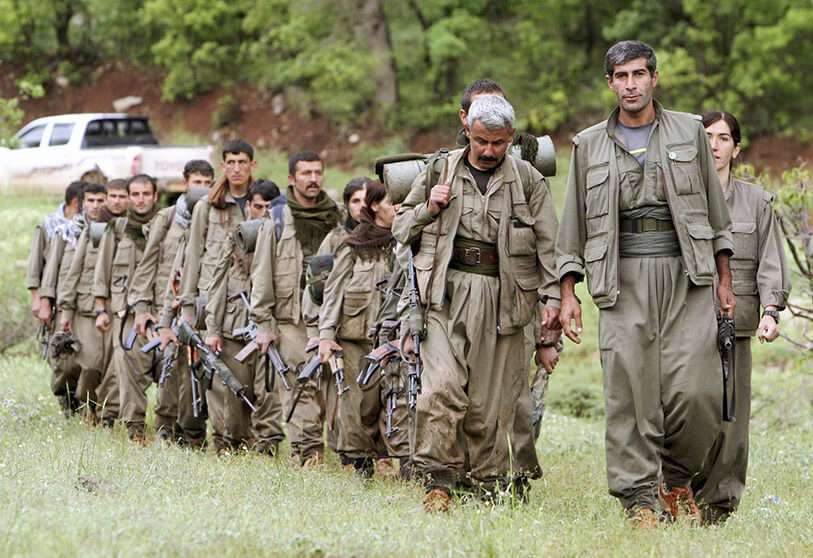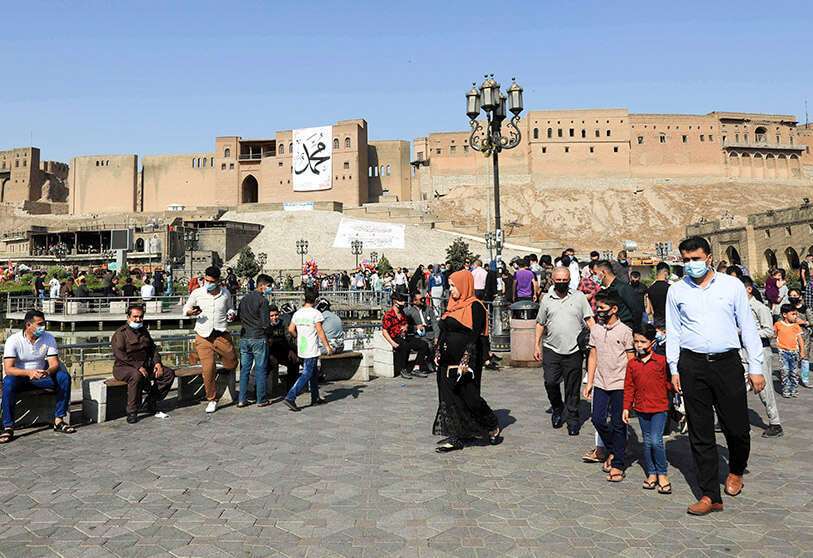Turkey takes advantage of the enmity between Kurds to advance positions in Iraq

The Kurds in Iraq are reorganising themselves. According to the media Al-Monitor, the Iraqi Kurdish forces have been deployed in a mountainous area "used for a long time as a camp by the PKK militants", reads the US-Arab newspaper.
This has caused the military forces of the Turkish president, Recep Tayyip Erdogan, to cross the line into Iraqi soil. Turkey's operations have been going on for months in the border areas of the territory of "Iraqi Kurdistan", which has been used by the PKK as a base for its armed campaign against Ankara for a long time.
Turkey's presence in the area is causing clashes with other local Turks and "stoking the fears of a new Kurdish fratricide", explains the newspaper Al-Monitor. The tensions increased in the middle of October when the Kurdish special forces, under the command of Masrour Barzani, prime minister of the Kurdistan Regional Government (KRG), moved to the northeast of Dohuk to surround the Gare mountain.
According to the Kurdish media, Barzani's forces were deployed in at least 10 locations and the command units established check points in the area. It should be remembered that Barzani has nothing to do with the PKK, but leads the Kurdistan Democratic Party (KDP), a dominant political force within Iraqi Kurdistan.
The KDP was attacked for siding with Turkey after they deployed peshmerga (Iraqi Kurdish militia) forces in a conflict area west of the Qandil Mountains, the area where the PKK's headquarters are located. It seems that the Kurds are beginning to have crossed interests.
The agreement of Erbil, the capital of Iraqi Kurdistan, on 9 October between the KDP and Baghdad has disturbed the PKK. The agreement is understood as an attempt to stabilise the Sinjar region populated by Yazidis near the border with Syria. It also aims to put an end to the PKK's presence in Iraq and to marginalise the Yazidi groups that support them.
Ankara, for its part, is afraid that the KDP will reorganise and has warned that it will not allow Sinjar to become "a second Qandil", carrying out several air strikes in the area. Erdogan is wary of the support the PKK has gained in Sinjar since it provided aid to the Yazidis fighting against Daesh in 2014.

The Kurdistan Workers' Party has been accused of murdering a senior official of the Iraqi Peshmergas security forces. The attack is said to have taken place at his home in a village near Dohuk on 8 October.
Although the PKK denied these accusations, one month later the Kurdistan Security Council announced on its side that 17 suspects, among them a dozen with links to the PKK, had been arrested for planning attacks on diplomatic missions and businesses in the region.
However, the members of the Patriotic Union of Kurdistan (PUK), the main political rival of the KDP, said that they were not aware of such plots. The PUK is having better relations with the PKK after the KDP signed the agreement with Bagdag.
According to PKK sources who spoke to the newspaper Al-Monitor, the Iraqi Kurdish deployment in Gare aims at helping Turkey to expand its military operations against the areas of the PKK camp.
The PKK has been developing activities in Gare since last year by focusing on Haftanin, on the other side of the border. The movement to surround Gare from the KDP, they say, "aims at isolating the area of Metina, which is north-west of Gare, and thus make it easier for the Turkish forces to descend on Metina from Haftanin", they have explained to Al-Monitor.
The Turkish media, on the other hand, have confirmed the military deployments as preparations of the Kurdistan Regional Government for a comprehensive military operation against the PKK, informing that the PKK camps have been surrounded and their routes to the interior cut off.
PKK commander Murat Karayilan has similarly accused the actions of the KDP saying that they look like preparations for war. "They want to put forces wherever we are. And if they continue like this, the prospect of all this becoming a war will not be far away. I, personally, would not like to order Kurdish militants to target other Kurds", he said in a TV interview last week.
Karayilan has also rejected the criticism that the PKK is mocking the authority of the KRG, targeting its institutions and endangering the Kurdish achievements in Iraq. "If Turkey kills the PKK, Erbil will be the next one in line", the commander wanted to warn.
From the other Kurdish point of view, the KDP heavyweights replied that the PKK, with its presence in Iraq, "was providing Turkey with a pretext to expand its military presence in Iraqi Kurdistan".
Rebwar Babkeyi, head of the foreign affairs committee of the Kurdish parliament, said that "the way for the PKK to show respect for the institutions of Kurdistan is to leave the territory of Iraqi Kurdistan. The presence of the PKK in the border areas has caused the evacuation of villages and the transfer of Turkish troops inside our borders".

Politicians and intellectuals called for restraint in the newspaper Al-Monitor, alarmed by the spectre of another intra-Kurdish bloodshed reminiscent of the 1990s. Mihemed Emin Pencewini, who mediated among the Kurdish groups at that time, warned that an outbreak of violence between the KDP and PKK "could involve all Kurds, urging everyone to act responsibly to avoid a crisis that could make the Kurdish cause go back half a century".
Political analyst Mustafa Sefik, a specialist of the Kurdish movements, told Al-Monitor that "the PKK is becoming more and more a burden for Iraqi Kurdistan". And he quoted three main factors that explain the sending of KDP troops to Gare. First, he argued, the PKK's actions are leading Turkey to the expansion of its military operations. Secondly, due to the increasing Turkish pressure from the north, the PKK is going deeper into Iraqi Kurdistan. And thirdly, the PKK is using its military power to subjugate other groups in the area.
According to Sefik, the KDP has realised that every time the PKK is repressed in Turkey, it always returns to Iraqi Kurdistan. "It could have been called a tactical mistake if it had happened once or twice. But the consistency suggests that this is a strategy," said the analyst. The PKK, he emphasized, has given Turkey ground to intervene both in Iraqi Kurdistan and in the Kurdish areas of Syria. "And this worries the Kurdistan government," he said.
Moreover, the PKK also takes sides in the internal affairs of Iraqi Kurdistan, Sefik said. "The PKK has always stood against the KDP. It has always incited the PUK against the KDP and sided with other KDP opponents".
A Kurdish source from Erbil, who requested anonymity from Al-Monitor, argued that "it was difficult for Turkey to intervene in Gare because the area is far from the border", but stressed that the KDP's own concerns had a role in the deployment of special forces and commandos in the area. According to the source, the KDP is suspicious of the growing presence of the PKK outside the camp, including the special teams present in the area between Gare and Soran. They also have doubts about interactions with local Kurds despite their commitment to refrain from seeking a popular base for themselves in Iraq.
The aim of encircling Gare, the source said, is to cut off the PKK's eastern route to Soran and hinder its westward movement to Kurdish-held northeast Syria. Meanwhile, a source close to the PKK told Al-Monitor that the special forces had partially withdrawn after a short skirmish south of Dinarta and that contacts had started between the two parties after independent mediators intervened to calm the tensions.
Even so, the KDP believes that the PKK is endangering the constitutional achievements of Iraqi Kurdistan by bringing its war with Turkey to the south. While the PKK maintains the transnational Kurdish problem and considers that the future of the Kurds should be handled as a whole.
These divergent political views show the internal weaknesses of the Turkish people and the different incompatible paths of their interests. This is an opportunity for Turkey, which is trying to revive old enmities in order to gain influence in the area and to finish off the PKK, inside and outside its borders.









